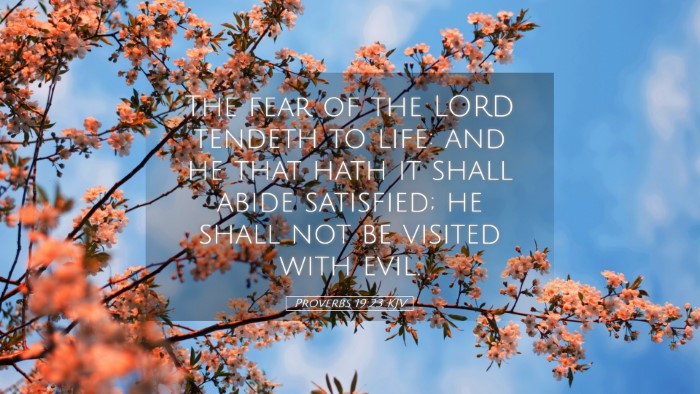Commentary on Proverbs 19:23
Proverbs 19:23 (KJV): "The fear of the Lord tendeth to life: and he that hath it shall abide satisfied; he shall not be visited with evil."
Introduction
The book of Proverbs is a profound source of wisdom that encapsulates various aspects of life through vivid metaphors and straightforward instructions. In Proverbs 19:23, the significance of the "fear of the Lord" is presented as foundational to a fulfilling and prosperous life. This commentary synthesizes insights from several public domain sources, including Matthew Henry, Albert Barnes, and Adam Clarke, to unpack the depth of this verse.
The Nature of the Fear of the Lord
Matthew Henry explains that the "fear of the Lord" is not a mere dread or anxiety but a reverent love and respect for God. It is the recognition of God’s greatness and holiness, leading to a life of obedience and devotion. This reverential relationship brings about an internal peace, as one aligns with God's will.
Albert Barnes emphasizes that "the fear of the Lord" signifies a profound respect and acknowledgment of God's authority, leading to wisdom and understanding. It is this disposition that becomes a guiding principle in life, keeping individuals from folly and leading them towards righteousness.
Adam Clarke further notes that the fear of the Lord is the root from which all true virtue grows. It lays the foundation for a life that seeks to please God and fosters genuine piety, contrasting sharply with secular views of happiness that often prioritize self-gratification.
The Promise of Life
The verse states that the fear of the Lord "tendeth to life." This phrase can be understood in various contexts:
- **Spiritual Life:** A life lived in reverence to God is one that flourishes spiritually. Matthew Henry notes that fearing God leads to a relationship filled with faith, hope, and spiritual vitality.
- **Physical Life:** Albert Barnes connects this promise to the notion that a life guided by divine principles often results in healthy living and longevity. Following God's commandments can protect one from the pitfalls of sin and its consequences.
- **Eternal Life:** Adam Clarke references that this verse also points to eternal life - the ultimate reward for those who maintain a holy reverence for God.
Abiding Satisfaction
The text states, "he that hath it shall abide satisfied." Here, we can draw a multi-faceted understanding:
- Contentment in God: According to Matthew Henry, those who fear the Lord find their satisfaction in Him alone, identifying that true contentment is rooted in a relationship with God, rather than in material wealth or earthly success.
- Joy in Obedience: Albert Barnes points out that obeying God's commands leads to a fulfilling life - one filled with joy and purpose, as God’s expectations are aligned with human flourishing.
- Satisfaction Through Trust: Adam Clarke articulates that trust in God's providence and a humble spirit towards Him create a deep-seated satisfaction within believers, ensuring they remain untroubled by life's uncertainties.
Protection from Evil
The latter part of the verse, "he shall not be visited with evil," serves as a pivotal assurance for the believer:
- Divine Protection: Matthew Henry concludes that God’s providence shields those who revere Him from calamities and evil that others may face. Their commitment to righteousness acts as a barrier against destructive influences.
- Spiritual Warfare: Albert Barnes emphasizes that while evil may still be a reality in a fallen world, the person fearing God is equipped to face such evils with courage and hope, fortified by divine strength.
- Understanding Trials: Adam Clarke warns that while believers who fear the Lord may still experience trials, they can find peace knowing that their lives are under God's sovereign care, which brings a sense of security that transcends understanding.
Conclusion
Proverbs 19:23 encapsulates a powerful truth about the life of faith. The fear of the Lord is an indispensable key to living a life filled with spiritual vitality, genuine satisfaction, and divinely-protected peace. Pastors, students, theologians, and scholars are encouraged to reflect on this verse and to consider the profound implications of cultivating a deep, reverent relationship with God as the foundation of their lives.
Reflection Questions
- How can we cultivate a deeper "fear of the Lord" in our daily lives?
- In what ways can we help others find fulfillment and protection through reverence for God?
- How do the concepts of life, satisfaction, and protection interconnect in our understanding of faith?


